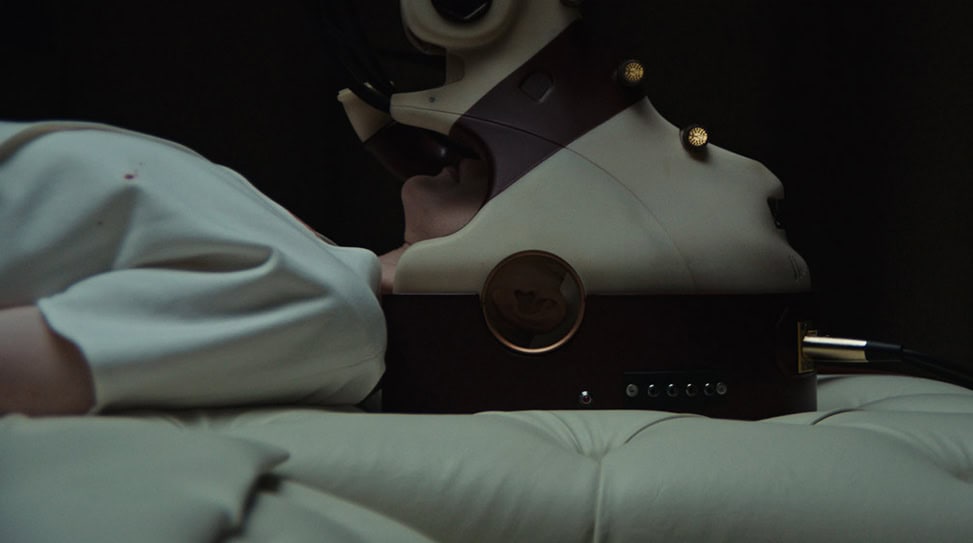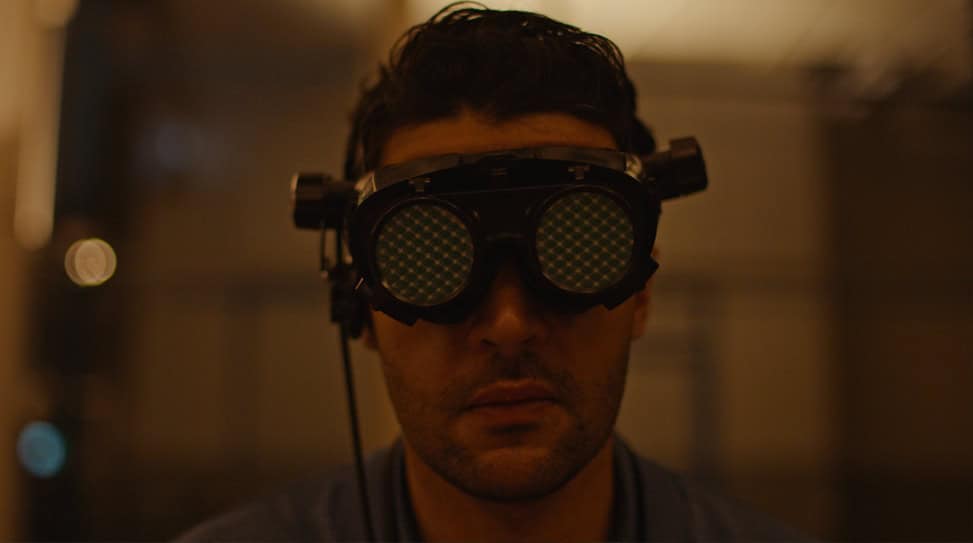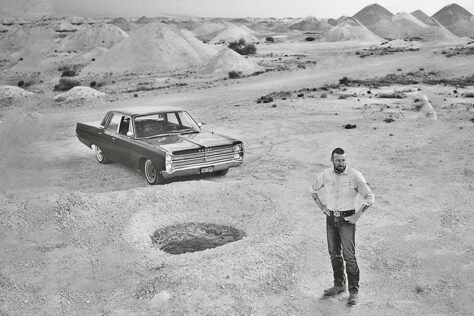There's plenty of bad projects going around. It’s like a diamond in the rough when you get a film that, on all levels, feels like a sure bet. Because the ultimate goal is to have something that’s a no-brainer, which is not always the case.
MKUltra is the code name for the CIA’s secretive mind control program in which the agency conducted hundreds of clandestine experiments, sometimes on unwitting citizens. MKUltra lasted from 1953 until about 1973, but details of the illicit program didn’t become public until 1975, during a congressional investigation into widespread and illegal CIA activities. Sidney Gottlieb is one chemist who was tasked with their ridiculously zany assignment: uncover the secrets to mind control. The CIA was looking for a truth serum, an amnesiac, and a way to program subjects into becoming spies, saboteurs, and assassins. The search involved some of the most extreme experiments on human subjects ever sponsored by the US government. But in trying to implant a new mind into a subject’s brain, Gottlieb had to first find a way to blast away the existing mind and abolish consciousness. Doctors who had experimented on inmates at Japanese and Nazi concentration camps were among his most valued partners. Together, they conducted intense drug, stress, and electroshock experiments on prisoners at secret detention centers across Europe and East Asia. An unknown number of victims perished. Many others were forever shattered. CIA director Allen Dulles was convinced that mind control could be the key to global mastery, and the loss of innocent lives to him was insignificant when weighed against fulfilling that promise.
Brain stimulation to modify behavior has a sordid history. In the ‘70s, neuropsychologist Robert Heath inserted electrodes into a gay man’s brain to cure him of his homosexuality by stimulating his brain’s pleasure center. Spanish neuroscientist José Delgado used brain stimulation in monkeys, people and even a charging bull to understand how, at a neural circuit level, specific behaviors and functions are controlled—and to control them at will by pushing buttons on a device, energizing electrodes implanted in the brain. Manipulating movements, altering thoughts, evoking memories, rage and passion were all at Delgado’s fingertips. Consider what a terrorist could do with access to a politician’s mind, or how coercive blackmail would be if someone could alter how you behave.
Mind control has long been the subject of films. John Frankenheimer’s The Manchurian Candidate (1962)—later remade by Jonathan Demme in 2004—saw a US war hero brainwashed into assassinating a presidential candidate. Christopher Nolan’s Inception (2010) was a high concept in which the decisions of a powerful businessman could be influenced by altering his dreams. In Brandon Cronenberg’s—yes, son of that David— latest musing on this subject, Possessor: Uncut, Andrea Riseborough is cerebral executioner Tasya Vos. Set in an alternate 2008 that’s a touch more analog than our own, she works as a gun for hire at a mysterious company that accepts lucrative bounty contracts from high-profile clients. Their methods? It’s basically a mercenary science experiment. With creepy-looking tech, agents like Tasya assume control of strangers’ minds to commit assassinations nearby. The new target? John Parse (Sean Bean), the egomaniac head of an Orwellian data-mining conglomerate. So Tasya goes into the mind of Colin Tate (Christopher Abbott), the fiancé of John’s daughter, to carry out the deed. But this time there’s a glitch, and Colin starts to regain control of his person with Tasya still inside, threatening to obliterate her.
Possessor: Uncut is likely unlike anything you’ve seen before. It is a visionary and singular work from Cronenberg, who grabs the body-horror baton from his father and forges new ground in the genre space. It also happens to be one of the best films of the year. Jennifer Jason Leigh also stars.
Possessor: Uncut opens in select theaters and drive-ins on October 2.
Possessor is quite original, isn’t it? We’ve become so inundated with franchises, adaptations, and reboots. We’re so many decades deep into the science fiction film. Do you inevitably end up sifting through a lot of stuff before something like this comes along?
Yeah, for sure. There’s plenty of bad projects going around. It’s like a diamond in the rough when you get a film that, on all levels, feels like a sure bet. Because the ultimate goal is to have something that’s a no-brainer, which is not always the case. Of course there have been many times where I was happily surprised, too, especially if it’s with a first-time filmmaker, where the script is great and I like them, but still, who knows, you know? It’s worked out. With this one, I had seen Antiviral already—Brandon’s [Cronenberg] first movie—and I loved it. I felt very assured in that way. And I liked him. The script was great: concise and economic and specific. He had a short film that I saw [Please Speak Continuously and Describe Your Experiences as They Come to You (2019)] that was sort of a precursor to Possessor, which I think was used as a form of experimentation with all the in-camera visual tricks that they were gonna do on this movie. So I got a strong visual concept of what it was gonna be. And then Andrea [Riseborough] came on. It was one of those things where all the boxes kind of ticked.
It gets to be a little bit tricky deconstructing movies like this because the intention was clearly to leave room for interpretation. For me, though, the parallel between the idea behind hijacking people’s identities and acting, as a craft, is one interpretation I can’t seem to move away from. Did this project remind you a lot about what you do for a living?
Yeah, in a way. That is kind of Vos’ job really, isn’t it? She’s an assassin. [Andrea has] said this before so I’m kind of stealing off of what she said: a lot of it is that Vos is kind of an actor. It’s her job within this thing to act as somebody else. So yeah, for sure. Thematically, I think that related quite well. The science fiction element of this movie doesn’t exist [in real life], right? It’s highly unrelatable in that way. So then you go off and realize about stuff that can be close to it, whether it’s mental health issues like schizophrenia or whatever. These are all things that can induce the same traits in somebody, you know?
For somebody whose job it is to study and replicate other people’s way of being, Vos struggles so much with her own identity. Do you think it was her assignment with Colin that drove her over the edge, or was she perhaps headed in that direction regardless, in her amalgamated state, having gone through however many lives that has damaged her irrevocably?
I guess that’s open for interpretation, but my opinion is that it probably would’ve happened anyway. I think the breakdown was already coming. The movie starts at the tail end of another job [for Vos] so you’re already getting a sense that she’s starting to falter a little bit. It’s talked about in the film that she’s done a lot of these jobs, and she’s the best in her field at it. You kind of get the sense that each one of the jobs that she has done has taken a piece of her own identity each time. In that way, we’re starting at the end.
Because she is shapeless or undefined when it comes to her own sense of self, what did you latch onto about Vos that you could really play from? I know you’re into human psychology.
I think it really just becomes a question of identity in that way. Often in life, we get very confused about things. You can be in your thirties and all of a sudden really start questioning who you are, or at anytime, really—it doesn’t matter how old you are. It’s a scary, ground-shaking moment when that happens because we all assume that we build up this personality over the years and that we’re meant to arrive at something or someone who is you. But man, it’s hard to tell sometimes who I am. Am I still trying to figure that out? [laughs] I have no idea. So that’s very relatable.
This role transcends gender in a really clever way. I do wonder if Vos’ femininity factored very much into your portrayal because, on the one hand, we do see how she studies this new body, Colin’s body, after waking up next to his fiancé. But then maybe she’s so good at her job that her objective negates any discomfort she might feel in a man’s body.
I talked about that with Brandon, too. Him nor I wanted it to be have an Idle Hands feeling. It’s clearly not her first time in a man’s body, right? I didn’t want it to be a newly born type of discovery of “what is this?” She’s the best at her job. She’s done it before. I think the scene that you’re talking about where she’s exploring Colin’s body is just a natural reaction. She’s getting in tune with it. Of course if you’re in someone else’s body, you’re going to look at everything.
Right, and totally regardless of gender.
Yeah, yeah.
Sharing a role with another actor is no doubt an interesting proposition right off the bat, and you’re not playing the same character at different stages of their life. You’re in the same body at once. How did you negotiate and then calibrate this role with Andrea?
If you break it down and look at it, Vos is only ever in Colin’s body when we’re playing the same character. Colin is never in Vos’ body, right? It becomes a question of tracking who’s at the forefront and when. In the beginning, I think it’s very much the tracking of it. Vos is in control of her job. She’s good at it. She mimics Colin by learning about his idiosyncrasies enough to do her job well. And then it starts to break down as the movie goes along. Vos I think starts to come out more, before the struggle reaches its peak. There is this constant flip-flop. I think it’s also important for the audience to be constantly questioning who is at the forefront, which is why there aren’t different voices. There are scenes where their voices are layered [on top of one another] when she’s connected in, but otherwise, you’re dealing with them one at a time.
Did you find that you were also studying just Andrea, beyond her portrayal of a character? Naturally, your basic human behaviors are going to seep into the performance somehow.
Yeah, absolutely. Before shooting, Andrea, Brandon, and I had a lot of conversations and spent a lot of time together. On set, there were a few scenes—even ones that didn’t make it into the movie—where we were in the same room together, physically mimicking each other. Of course, sometimes, I would watch a scene that Andrea did just before and pick up on certain tiny gestures she would do. Some of those we would earmark and Brandon, Andrea, and I would track it. I think the most obvious one was the thing with the apple. It’s pretty subtle, but there’s a thing with the licking of the lips in certain moments. And then there are other little things you try to throw in there, like the way she holds her body and vice versa.
Did the finished film look very similar to what you had sketched out in your head?
Brandon is very clear about what he wants and how he wants it to look. Also, he had that short film I got to see before doing it, which, again, they used as an experiment to do a lot of the same tricks like camera moves on this film. So it looked like what he had showed me.
You’ve previously talked about Brandon’s script having been sparse, but signaling a maturity in that sparseness, as opposed to signaling a writer who maybe doesn’t have much more to write about or lacking a confidence.
I personally love that [sparseness] because that means I have room to fill in those things myself. It’s not that I don’t like scripts that are verbose. If it works, it works. But the economy of the dialogue in this I think just really goes with the style of the film and the kind of sharpness that it has. So I think the objectives were absolutely clear. The in-betweens are just colors that I can fill in, whether it’s with mimicking glances or whatever else you think might help the scene along. I like doing that.
I found it funny when Andrea went on the record to say that Brandon would often preface his directions with “this is going to be a little weird, but—” At what point do you trust your directors? Do you commit to trusting them from the get-go because that’s something you require as an actor, or do you hope to find that trust in the process somewhere, somehow?
I think it’s a bit of both and it’s case-by-case, really. I had already trusted Brandon just based on his first film. When you work with someone who has a body of work that has proven itself, you already feel like you’re in good hands. Now, with a first-time director—I’ve done a lot of first features over the years—you maybe have to find it. Often, I think my gut for the most part has been pretty right. It’s really just about someone knowing exactly what they want, and whether or not they have the right references to go along with that and it makes sense to you. Or their taste just matching your taste is what it really comes down to. I think that’s really what it’s about with trust.



 Clarion Call: Garrett Hedlund
Clarion Call: Garrett Hedlund A Conversation with Simon Baker
A Conversation with Simon Baker
No Comments